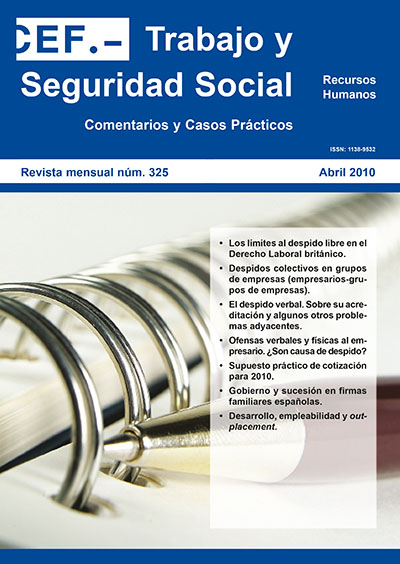Governance structures and succession planning in spanish family companies
DOI:
https://doi.org/10.51302/rtss.2010.5317Keywords:
family firm, governance, succession processAbstract
Family firms are the most common business formula in the Western world, being at the core of economic activity and supporting development and social cohesion. They are currently facing a double challenge: first, the professionalization of management, and second, addressing the succession process. In the present study, an analysis has been carried on the governing bodies that characterize this type of companies and their relation to the practices they are adopting with the aim of achieving continuity. The sample was formed by a total of 69 corporations in our country, belonging to all the Autonomous Communities. From a methodological point of view, data were obtained using an instrument that was specifically elaborated for this study, assorted documents provided by the companies, and personal interviews with their main agents. Following the results of the statistical analyses performed on the recorded data, a set of recommendations for family companies are provided.
Downloads
References
Allinson, C., Chell, E. y Hayes, J. [2000]: «Intuition and entrepreneurial behaviour». European Journal of Work and Organizational Psychology, 9, 1, 31-43.
Amat. J.M. [1998]: La Continuidad de la Empresa Familiar. Barcelona: Gestión 2000.
Amat, J.M. y Corona, J. [2007]: El Protocolo Familiar: La Experiencia de una década. Barcelona: Deusto.
Astrachan , J.H. y Jaskiewicz, P. [2008]: «Emotional Returns and Emotional Costs in Privately Held Family Businesses: Advancing Traditional Business Valuation». Family Business Review, 21, 2, 139-149.
Astrachan, J.H. y McMillan, J. [2003]: Conflict and Communication in the Family Business. Georgia: Family Enterprise Publishers.
Ayala, J.C. [2002]: Creación de Valor en la Empresa Familiar. Madrid: PricewaterhouseCoopers.
Blumenritt, T. [2006]: «The Relationship Between Boards and Planning in Family Businesses». Family Business Review, vol. XIX, 1, 65-72.
Carr, C., Scott L., Boyar B. y Gregory, T. [2008]: «The Moderating Efeect of Work-Family Centrality on Work-Famili Conflict, Organizational Attitudes, and Turnover Behavior». Journal of Management, 34, 244-262.
Carr, J. y Sequeira, M. [2007]: «Prior family business exposure as intergenerational influence and entrepreneurial intent: A theory of planned behavior approach». Journal of Business Research, 6, 10, 1.090-1.098.
Carrigan, M. y Buckley, J. [2008]: «What’s so special about family business? An exploratory study of UK and Irish consumer experiences of family businesses». International Journal of Consumer Studies, 32, 6, 656-666.
Craig, J., Clay D. y Davis, P. [2008]: «Leveraging Family-Based Brand Identity to Enhance Firm Competitiveness and Performance in Family Businesses». Journal of Small Business Management, 46, 3, 351-371.
Craig, J. y Moores, K. [2006]: «A 10 year longitudinal investigation of strategy, systems, and enviroment on innovation in family firms». Family Business Review, 19, 1, 1-10.
Casillas, J. C. y Acedo, F.J. [2005]: «Internationalization of Spanish family SMEs-Análisis of family involvement». International Journal of Globalization and Small Business, 12, 4, 227-243.
– [2007]: «Evolution of the intellectual structure of family business literature: A bibliometric study of FBR». Family Business Review, 20, 2, 141-162.
De la Torre, A. [2005]: «La Cultura de la Empresa Familiar». En Corona, J. (Ed.), Manual de la Empresa Familiar. Barcelona: Deusto.
European Council for Small Business –ECSB– [1997]: Newsletter, 4.
Fernández, Z. y Nieto, M.J. [2005]: «International stategy of small and médium-sized family businness: some influential factors». Family Business Review, 18, 1, 77-89.
Frese, M. [2000]: Success and Failure of Microbusiness Owners in Africa: A Psychological Approach. Westport: Greenwood.
Frese, M, Chell, E. y Klandt, H. [2000]: «Introduction». European Journal of Work and Organizational Psychology, 9, 1, 3-6.
Gallo, M. [2008]: Ideas Básicas para dirigir la Empresa Familiar. Pamplona: Ediciones Universidad de Navarra.
Gallo, M.A. y García Pont, C. [1996]: «Important factors in family business internationalization». Family Business Review, 9, 1, 45-60.
Grant, R.M. [2004]: Dirección Estratégica. Madrid: Civitas.
Lansberg, I. [1999]: Succeeding Generations. Boston: Harvard Business School Press.
Neubauer, F. y Lank, A. [1999]: La Empresa Familiar. Barcelona: Deusto.
Preston, J. y Lowe, K. [2007]: «Unlocking Foreclosed Beliefs: AnAutoethnographic Story about a Leadership Dilemma». Familiy Business Review, 13, 3, 239-249.
PricewaterhouseCoopers [2008]: Informe global sobre la Empresa Familiar 2007-2008. Madrid: PricewaterhouseCoopers.
Rutherford, M, Muse, L. y Oswald, L. [2006]: «A new perspective on the developmental model for family business». Family Business Review, 19, 4, 317-333.
Saldaña, P. [2005]: La Empresa Familiar: Modelos de Sucesión en compañías de varias familias propietarias. Barcelona: Tesis Doctoral no publicada.
Sharma, P., Christma, J. y Chua, J.H. [1997]: «Strategic Management in the family business: Past research and future challenges». Family Business Review, 10, 3, 1-37.
Simon, D. y Hitt, M. [2003]: «Managing resources: linking unique resources, management and wealth creation in family firms». Entrepreneurship Theory and Practice, 27, 4, 339-358.
Titelman, P. [2008]: Triangles: Bowen Family Systems Theory Perspectives. New York: The Haworth Press.
Ward, J.L. [2004]: Perpetuating the Family Business. 50 Lessons Learned from Long-Lasting, Successful Families in Business. Nueva York: McMillan.
Zahra, S.A. [2005]: «Entrepreneurial risk taking in family firms». Family Business Review, 18, 1, 23- 40.



















